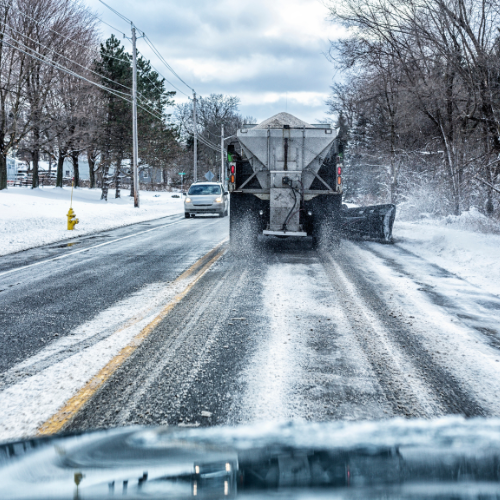
Tips for Individuals and Businesses
Winter storms can throw a wrench into both your personal plans and workday routines. Whether it’s icy roads or freezing temperatures, staying safe during winter weather starts with preparation. From your own car to your company’s fleet, a little planning can go a long way in keeping things running smoothly.
Get Your Vehicles Winter-Ready
It’s always better to prep your car (or your fleet) before winter weather hits. Here’s a quick checklist to make sure you’re ready for the road:
- Antifreeze: Top it off to keep your engine from freezing.
- Battery: Clean the terminals and make sure it’s in good shape—cold weather is tough on batteries.
- Brakes: Double-check they’re in top condition for icy stops.
- Exhaust System: Look for leaks to avoid carbon monoxide risks.
- Fuel and Air Filters: Replace them as needed, and keep your gas tank at least half full to stop the fuel lines from freezing.
- Heaters and Defrosters: Make sure they work to keep you warm and your windshield clear.
- Winter Tires: Check your tread depth and consider snow tires or chains if you’re in a snow-heavy area.
For businesses managing fleets, routine winter maintenance helps prevent costly downtime and keeps your team safe and on schedule.
Pack an Emergency Kit
Whether it’s your daily commute or a business trip, an emergency kit in your vehicle can be a lifesaver. Here’s a suggestion on what to pack:
- Shovel
- Windshield scraper and broom
- Flashlight and extra batteries
- Water and non-perishable snacks
- Warm clothing (hats, gloves, socks) and blankets
- Road salt or sand for traction
- Booster cables and emergency flares
Businesses can take it a step further by equipping company vehicles with standardized kits, so everyone is ready for the unexpected.
Know the Weather Lingo
Understanding winter weather alerts can help you make smarter decisions:
- Freezing Rain: Coats surfaces in ice—extremely slippery!
- Sleet: Frozen rain that turns roads into skating rinks.
- Winter Weather Advisory: Conditions might cause problems, so drive carefully.
- Winter Storm Watch: Bad weather could be on the way—stay tuned for updates.
- Winter Storm Warning: Dangerous weather is happening or about to happen—act now.
- Blizzard Warning: High winds, heavy snow, and almost no visibility.
For businesses, monitoring weather alerts helps you decide whether employees should work remotely or commute safely.
What to Do If You’re Stranded
Getting stuck in a winter storm can be scary, but knowing what to do makes a big difference:
- Stay Put: Your vehicle is your best shelter, and it’s easier for rescuers to find you.
- Signal for Help: Use hazard lights or a distress flag.
- Run the Engine Safely: Run it for 10 minutes every hour to stay warm, but clear the exhaust pipe to avoid carbon monoxide poisoning.
- Stay Warm: Use blankets, extra clothing, or even seat covers for insulation.
- Be Visible: Turn on interior lights at night and use big letters to spell out “HELP” in the snow if you’re in a remote area.
Employers should provide training for drivers on what to do in emergencies—especially for those traveling for work.
For Businesses: Protect Your Team and Your Operations
Winter prep isn’t just about safety; it’s about keeping things running smoothly. A few proactive steps can prevent disruptions and keep your team safe:
- Educate Employees: Teach them how to winterize their vehicles and handle emergencies.
- Update Policies: Create a winter weather plan with remote work options and clear travel guidelines.
- Stay Connected: Use communication tools to keep everyone updated on weather conditions and safety expectations.
Showing your team that you care about their safety builds trust and boosts morale—and it doesn’t hurt your reputation with clients, either!
Seubert & Associates, Inc. is here to support you, whether you’re protecting your family or managing a team. By taking these steps, you can minimize risks and maximize safety this winter. Contact us today for personalized risk management solutions tailored to your needs. Stay safe, stay warm, and keep things moving—no matter what winter throws your way!
- |
- |

Managing Fleet Costs: Trends, Strategies & Insurance Perks
Fleet maintenance is vital, but rising costs from inflation, supply chain issues, and tech advances

Safety Committee Best Practices
A safety committee can unite employees, management, and safety professionals to address workplace hazards proactively.

2023 Census: Construction Tops Fatality Rates Among Industries
The U.S. saw 5,283 workplace fatalities in 2023, with a rate of 3.5 per 100,000
